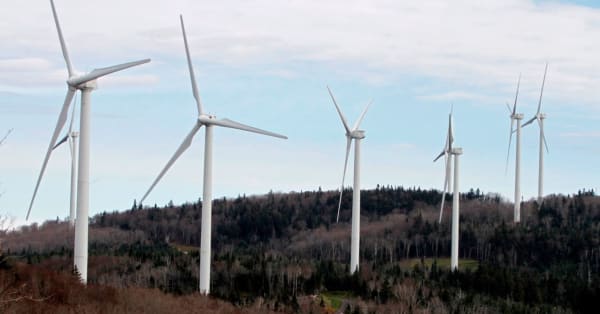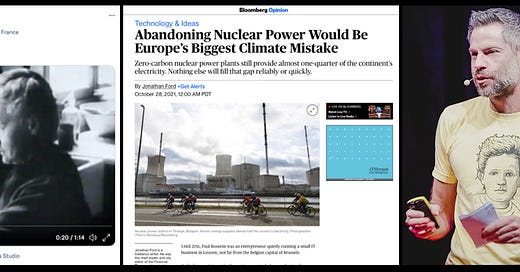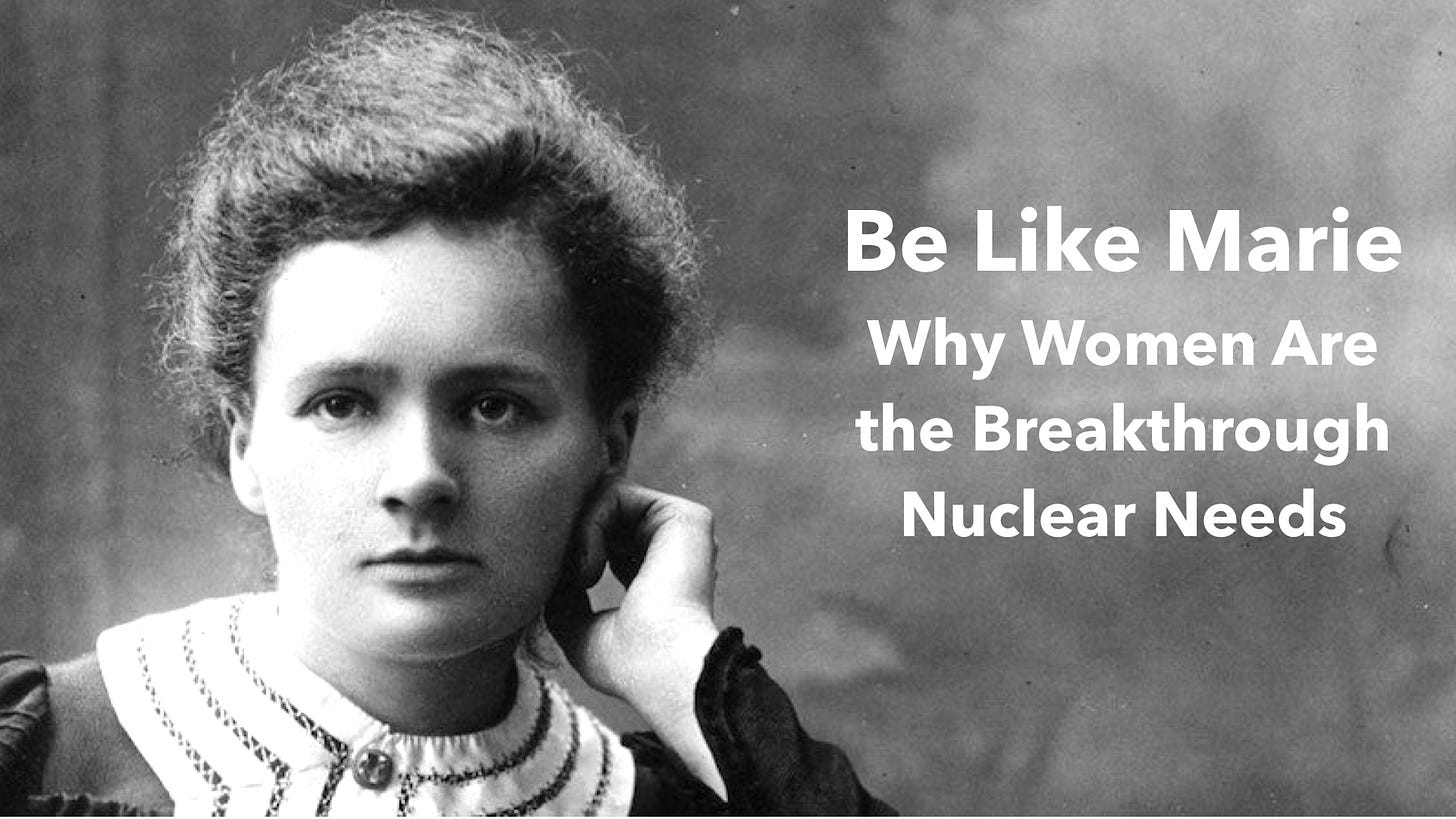
Why The Pro-Nuclear Movement Is Winning
Hint: By doing the opposite of what the anti-nuclear movement has done
“Abandoning Nuclear Power Would Be Europe’s Biggest Climate Mistake,” screams Bloomberg today. “If Biden is serious about the climate crisis, he should put nuclear on the table,” opined a contributor to The Los Angeles Times on Wednesday. “The Dream Is Possible,” tweeted French President Emmanuel Macron, earlier this month.
Viewed as politically radioactive just a decade ago, after the Fukushima accident, nuclear power is today coming back in a big way. The pro-nuclear movement is growing like gangbusters in even hostile nations like Belgium, Germany, and Australia. The world’s largest economies including Japan, Britain, and France are returning to nuclear energy. And it is becoming increasingly clear to liberals and conservatives alike that only nuclear can achieve global prosperity and environmental sustainability.
Naturally, anti-nuclear activists are alarmed by all of this. This morning I received a menacing letter from an anti-nuclear university professor in Britain demanding that I tell him “why you maintain your own ostensibly ‘green’ advocacy of nuclear power, at a time when this case is more difficult to sustain.” Left-wing magazine Boston Review asked “Is Nuclear Power Our Best Bet Against Climate Change” that went out of its way to smear me as promoting “climate denial” for promoting our largest source of zero-emissions energy.
The main reason for the success of the pro-nuclear movement is the failure of renewables and the global energy crisis. The share of global energy from fossil fuels is unchanged since 1980 because solar and wind do not replace fossil fuel power plants, and, in fact, depend upon them. Only baseload hydro-electric and nuclear power plants can replace fossil fuels. And over-investment in unreliable renewables and underinvestment in nuclear, hydro-electricity, and natural gas, over the last decade, directly resulted in today’s energy shortages, skyrocketing electricity prices, and a return to coal around the world.
But there is another reason for the pro-nuclear movement’s success that may come as a surprise. For decades, nuclear energy supporters have promoted the idea that nuclear energy is a compliment to intermittent solar and wind energies. Pro-nuclear people have argued that we should emphasize the risk of climate apocalypse for why nations should build nuclear plants. And nuclear boosters have argued that, when educating policymakers, journalists, and the public about the technology, we should emphasize the deficiencies of existing nuclear plants, and promote next generation technologies.
As an outsider to the nuclear science and technical community, these arguments made increasingly little sense to me, as time passed. Natural gas and hydroelectric dams are compliments to intermittent solar and wind, because their output can be easily and efficiency turned up or down, whereas nuclear plants are most efficiently run at full-power. Climate change is real but climate alarmism is dishonest and alienates many people who support nuclear energy for other reasons. And futuristic nuclear plants are a long ways off, which means it’s misleading at best, and self-destructive at worst, to hype nuclear technologies that only exist on paper.
The most important thing is to tell the truth about nuclear, I argued to friends and colleagues, starting in 2016, and build an honest pro-nuclear movement worldwide around the truth. Anti-nuclear people have been lying about the technology for decades. For pro-nuclear people to have any credibility, we must tell the truth, the whole truth, and nothing but the truth, about nuclear power. And we must build our movement on the basis of the truth, and push back against those who exaggerate climate change, who suck up to the renewable energy industry like battered wives, and who sell fairy tales about magical nuclear reactors.
More than anything else, my colleagues at EP and I argued, we must humanize nuclear. How? By being like Marie Curie. She was the first woman to win a Nobel Prize and the first person, and only woman, to win two Nobel Prizes, one for physics, in 1903, and the other for chemistry. But more important than any of her many recognitions, Marie Curie was the first atomic humanist, someone who puts the power of the atom in service of the the world. When World War I broke out, she went to the French government with a plan: she would create and oversee 200 hundred mobile medical units — which would become known as “petites Curies” — to use x-rays to diagnose injuries and radium to sterilize infected tissue.
Not everybody agreed, and Environmental Progress and I paid a heavy price for telling the whole truth about nuclear. Many pro-nuclear people found that they were more welcomed by polite society, dominated as it is by Malthusian environmentalists and renewable energy advocates, by claiming to be pro-renewables and to favor only “advanced designs,” not “legacy nuclear plants.” Some ostensibly pro-nuclear people ridiculed us for organizing pro-nuclear demonstrations in places like Munich, Germany, where the vast majority of the public was against us. And others even went so far as to speak out against building new nuclear plants, with the idea that doing so would win over climate alarmists (spoiler alert: it didn’t).
It hasn’t been easy. In fact, it was often exhausting, which you can see in my eyes in various photos over the years. The renewable energy industry has financed misinformation efforts against us. We have been censored by Facebook. And we have lost some supporters. But through it all, EP kept up our work, directly supporting and championing the work of pro-nuclear advocates around the world, giving popular TED talks, and writing a best-selling book, Apocalypse Never, which has been translated into 15 languages


Now, our work is having impacts that we could never have imagined. Where five years ago there was just Environmental Progress building the pro-nuclear movement, today there are a dozen organizations around the world. EP has started a grants-making program to support them financially. One of our grants was to pro-nuclear activists in Germany, a nation that many pro-nuclear people felt we should abandon. Next month, they will hold yet another rally to protest plans by the German government to shut down three nuclear reactors in December, at a time of skyrocketing electricity prices and the growing risk of blackouts. Australia is seriously considering nuclear energy for the first time. And, as the Bloomberg article notes, we may be headed to yet another victory in Belgium, on top of the victories we have won in Illinois, South Korea, New York, and around the world.
As the world returns to nuclear, political leaders are telling the truth about the technology. Nuclear is a blessing, not a curse. We need it to address climate change, and protect the environment. But most of all we need nuclear to lift people out of poverty, and power our remarkable civilization, which is the point I will make in my next book, The War on Nuclear: Why It Hurts Us All, which I dedicate to pro-nuclear activists.
I was struck while watching the pro-nuclear video tweeted by French President Macron of old film footage of Marie Curie, which I hadn’t known existed. She was a beautiful person, inside and out. At various moments during her lifetime she was considered politically radioactive, and indeed sacrificed her health pursuing her dream. But a more truthful way to describe Curie, today’s pro-nuclear movement, and the truth upon which it rests, is radiant.










I have never been a fan of nuclear energy, but that has mainly to do with the fact that I have worries around the long lifespan of nuclear material (the longer the timescale the more uncertainty there is with how the future turns out and how our society develops, wars that are fought etc.) and the potential for things like hurricanes (which are likely to increase in future as temperatures rise) to cause catastrophic situations.
However, I watched your Ted Talk on nuclear energy a couple of weeks ago, and really wanted to get back to you to let you know that you are the first person who has managed to make an argument for nuclear that was actually persuasive to me. I guess I would also rather see a more equitable/horizontal and social energy transition, and nuclear power is inherently something that needs centralised organisation, but most wind and solar farms are currently deployed by large energy and fossil fuel companies, so it's not like that is by definition going to achieve that. If we really want to address climate change as best we can, we need to look at the facts, which includes honestly examining why renewables aren't replacing fossil fuels at the rate they need to (if at all). Seeing the massive switch back to coal power in Europe this year has been especially frustrating to see. I commend you for making the challenging case for something to break this cycle of evermore fossil fuel burning, and find it disheartening to see that you get so much pushback from the green movement. Again, we should honestly look at the facts and see where those lead us.
How do you see the role of nuclear power in states prone to conflict, like for example the way nuclear plants are currently being shelled in Ukraine, doesn't this underscore an extra need for international collaboration and peace building, or is that wishful thinking? And what does this say about the potential risks around nuclear power in future as our societies destabilise in the face of more extreme weather, migration, and geo-political power struggles?
More from "Boston Review" but Texas Blackouts killed ~200 and co$t $ BILLIONS>>> To Save the Climate, Give Up the Demand for Constant Electricity
Waiting to ensure uninterrupted power for everyone as we transition away from fossil fuels will cost too much time—and too many lives. https://bostonreview.net/science-nature/david-mcdermott-hughes-save-climate-give-demand-constant-electricity